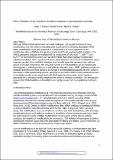| dc.contributor.author | Damon, Jadyn Rose | |
| dc.contributor.author | Ploegh, Hidde | |
| dc.contributor.author | Pincus, David | |
| dc.date.accessioned | 2015-01-05T18:23:05Z | |
| dc.date.available | 2015-01-05T18:23:05Z | |
| dc.date.issued | 2014-11 | |
| dc.date.submitted | 2014-10 | |
| dc.identifier.issn | 1059-1524 | |
| dc.identifier.issn | 1939-4586 | |
| dc.identifier.uri | http://hdl.handle.net/1721.1/92589 | |
| dc.description.abstract | Although tRNA modifications have been well catalogued, the precise functions of many modifications and their roles in mediating gene expression are still being elucidated. While tRNA modifications were long assumed to be constitutive, it is now apparent that the modification status of tRNAs changes in response to different environmental conditions. The URM1 pathway is required for thiolation of the cytoplasmic tRNAs tGlu[superscript UUC], tGln[superscript UUG] and tLys[superscript UUU] in Saccharomyces cerevisiae. We demonstrate that URM1 pathway mutants have impaired translation, which results in increased basal activation of the Hsf1-mediated heat shock response; we also find that tRNA thiolation levels in wild type cells decrease when cells are grown at elevated temperature. We show that defects in tRNA thiolation can be conditionally advantageous, conferring resistance to endoplasmic reticulum stress. URM1 pathway proteins are unstable, and hence are more sensitive to changes in the translational capacity of cells, which is decreased in cells experiencing stresses. We propose a model in which a stress-induced decrease in translation results in decreased levels of URM1 pathway components, which results in decreased tRNA thiolation levels, which further serves to decrease translation. This mechanism ensures that tRNA thiolation and translation are tightly coupled and coregulated according to need. | en_US |
| dc.language.iso | en_US | |
| dc.publisher | American Society for Cell Biology | en_US |
| dc.relation.isversionof | http://dx.doi.org/10.1091/mbc.E14-06-1145 | en_US |
| dc.rights | Creative Commons Attribution | en_US |
| dc.rights.uri | http://creativecommons.org/licenses/by-nc-sa/3.0 | en_US |
| dc.source | American Society for Cell Biology | en_US |
| dc.title | tRNA Thiolation Links Translation to Stress Responses in Saccharomyces cerevisiae | en_US |
| dc.type | Article | en_US |
| dc.identifier.citation | Damon, Jadyn R., David Pincus, and H. L. Ploegh. “tRNA Thiolation Links Translation to Stress Responses in Saccharomyces Cerevisiae.” Molecular Biology of the Cell (November 12, 2014). | en_US |
| dc.contributor.department | Massachusetts Institute of Technology. Department of Biology | en_US |
| dc.contributor.department | Whitehead Institute for Biomedical Research | en_US |
| dc.contributor.mitauthor | Damon, Jadyn Rose | en_US |
| dc.contributor.mitauthor | Ploegh, Hidde | en_US |
| dc.relation.journal | Molecular Biology of the Cell | en_US |
| dc.eprint.version | Final published version | en_US |
| dc.type.uri | http://purl.org/eprint/type/JournalArticle | en_US |
| eprint.status | http://purl.org/eprint/status/PeerReviewed | en_US |
| dspace.orderedauthors | Damon, Jadyn R.; Pincus, David; Ploegh, Hidde L. | en_US |
| dc.identifier.orcid | https://orcid.org/0000-0002-1090-6071 | |
| mit.license | PUBLISHER_CC | en_US |
| mit.metadata.status | Complete | |
